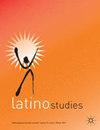声波边境突袭:种族声乐与当代拉丁歌剧
IF 0.9
Q3 SOCIOLOGY
引用次数: 0
摘要
这篇文章分析了两部当代拉丁裔歌剧《月之女神》(Cruzar la Cara de la Luna)(2010 年)和《安全距离下的潘乔-比利亚》(Pancho Villa from a Safe Distance)(2016 年),将 "acousmatic "发展为一种种族化的聆听形式。acousmatic "指的是一种来源不明的声音,一种无法接触到声音来源的听觉形式。当代拉美歌剧上演了一种政治化的 "Acousmatic "聆听形式,它迫使人们与原本听不到、看不到或被拒绝的声音相遇。我提出这一观点是为了解读这一领域中种族、声音和表演之间的关系。本文章由计算机程序翻译,如有差异,请以英文原文为准。

Sonic border raids: The racial acousmatic and contemporary Latinx opera
This essay analyzes two contemporary Latinx operas, Cruzar la Cara de la Luna (2010) and Pancho Villa from a Safe Distance (2016), to develop the “acousmatic” as a racialized form of listening. Acousmatic refers to a sound whose source is undetermined, a form of hearing without access to the source of the sound’s production. Contemporary Latinx opera stages a politicized form of acousmatic listening that forces an encounter with what is otherwise unheard, unseen, or refused. I develop this idea to unpack the relationships among race, sound, and performance in this sphere.
求助全文
通过发布文献求助,成功后即可免费获取论文全文。
去求助
来源期刊

Latino Studies
SOCIOLOGY-
CiteScore
0.90
自引率
0.00%
发文量
39
期刊介绍:
Latino Studies has established itself as the leading, international peer-reviewed journal for advancing interdisciplinary scholarship about the lived experience and struggles of Latinas and Latinos for equality, representation, and social justice. Sustaining the tradition of activist scholarship of the founders of Chicana and Chicano Studies and Puerto Rican Studies, the journal critically engages the study of the local, national, transnational, and hemispheric realities that continue to influence the Latina and Latino presence in the United States. It is committed to developing a new transnational research agenda that bridges the academic and non-academic worlds and fosters mutual learning and collaboration among all the Latino national groups.
Latino Studies provides an intellectual forum for innovative explorations and theorization. We welcome submissions of original research articles of up to 8,000 words, from scholars and practitioners in the national and international research communities.
In addition to scholarly articles, we also invite other type of submissions. Vivencias or ''reports from the field'' are short personal essays between 2000-3000 words that describe and analyze significant local issues, struggles and debates affecting the lives of Latinas/os in different regions of the country. We also welcome interviews with Latinas/os who are contributing in their local communities or nationwide (e.g. authors, artists, community activists, union leaders, etc.). Our aim in publishing the ''reports'' is to inform readers about events that are sometimes over-looked by the national and regional media.The Reflexiones Pedagógicas section includes short essays between 2000-3000 words that address issues of pedagogy and curriculum. This section contributes toward the development and institutionalization of our field in the academy. Páginas Recuperadas are short essays between 2000-3000 words that seek to recover archival documents. These essays make visible, historically significant achievements by individuals, and pivotal events in the experience of Latinas/os in the United States. El Foro is an occasional section that provides a space for essays of approximately 6000 words, addressing current events, in an effort to further engage our readers in a dialogue on the pressing issues affecting Latina/o communities today.Book and media reviews are devoted to scholarship/media on the experience of Latinas/os in the United States. Reviews are no more than 1000 words.
 求助内容:
求助内容: 应助结果提醒方式:
应助结果提醒方式:


